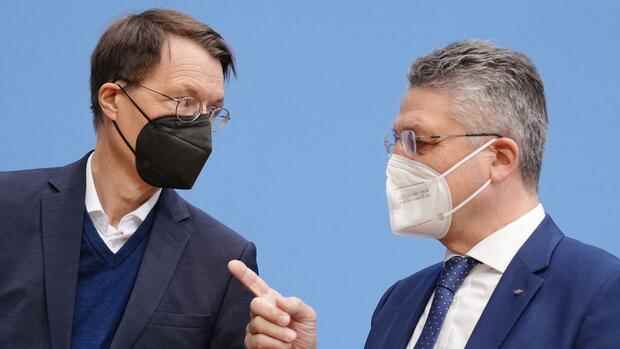In Berlin, the health minister and the head of the RKI informed the public about the corona situation on Friday.
(Photo: dpa)
Berlin In the future, staff in medical facilities should have priority for PCR tests. Federal Minister of Health Karl Lauterbach (SPD) announced a prioritization of the test capacities on Friday at the federal press conference, in which he, together with the head of the Robert Koch Institute (RKI), Lothar Wieler and the virologist Christian Drosten, informed about the corona situation in Germany.
Wieler added that because of the omicron variant of the coronavirus – which is considered to be significantly more contagious than the delta mutant – the test strategy will continue to change in the coming months. Like Lauterbach, he no longer sees a great need to laboriously prove the distribution of the now dominant omicron variant.
So you can save on certain PCR tests and concentrate them where they are particularly needed, said Lauterbach. If the situation becomes endemic and the virus causes less severe diseases, you will have to test less anyway, Wieler added.
According to Wieler, Germany is entering a “new phase of the pandemic” with the spread of the omicron variant. “The pure number of cases will be less decisive. It is more important how many people become seriously ill with Covid-19 and how heavily the health system will then be burdened, ”said the RKI President.
Top jobs of the day
Find the best jobs now and
be notified by email.
However, he also warned that even if infections caused by Omikron were milder overall, “due to the mass of infections, we unfortunately have to be prepared for the fact that the number of hospitalizations and deaths will of course increase again”.
On Friday, the RKI reported a new record for new infections: In the past 24 hours, 92,223 people in Germany have been shown to have been infected with the coronavirus, the seven-day incidence rose from 427.7 to 470.6. 286 people died from or with the virus.
Lauterbach expects the number of infections to increase even more, but is counting on containment through further everyday restrictions and more vaccinations. The strategy is to slow down and stretch the omicron wave and to boost as many people as possible with booster vaccinations during this time, said the SPD politician.
The pandemic is now “in difficult waters” in Germany. More people would have to be treated with infections, hospitals would be more heavily burdened. At the same time, the restrictions that were already in place were having an effect – for example with a longer doubling time for the number of infections. In addition, there are now even stricter access rules for vaccinated and recovered people with additional tests (2G plus) in the catering trade. Lauterbach currently considers the measures to be sufficient.
Three million unvaccinated people over 60
The goal now is “to make a hill out of the otherwise expected steep wall of infection numbers or that the wall is not that high,” said Lauterbach. However, it is a special problem in Germany that there are many unvaccinated people in the particularly vulnerable group of older people.
For this reason, Drosten warned against relying on the population being infected. In Germany, three million people over the age of 60 are currently unvaccinated. Almost nine million people in the Federal Republic lack the booster, which means they are not fully protected against Omicron. But at some point you have to “let the virus run” because you can’t keep vaccinating the population, said Drosten.
More: The biontech factor: Vaccine producers contribute almost a fifth to economic output
